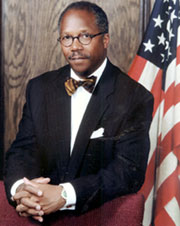Charles Stith

Charles Stith
September 28, 2002
The near-simultaneous bombing attacks on U.S. embassies in Nairobi, Kenya, and Dar es Salaam, Tanzania, on August 7, 1998 caused more casualties than any other terrorist attack had that year. In Nairobi, the attack killed 291 persons and wounded about 5,000. The bombing in Dar es Salaam killed 10 persons and wounded 77.
In the traumatic period after the bombing, Charles R. Stith, now the director of the African Presidential Archives and Research Center at Boston University, was serving as the U.S. Ambassador to Tanzania. In the months to follow, he worked to set new standards for American embassies by promoting U.S. trade and investment in Africa. After negotiating agreements with Delta and Northwest airlines, he got Tanzania to sign the first ever Open Skies Agreement between an African country and the United States. In 1999, Stith organized Tanzanian President Benjamin Mkapa’s historic visit to the United States. That visit had the distinction of having the largest delegation of African business leaders ever to accompany an African head of state on a visit to a Western nation.
Stith gave a talk titled "Peace, Security and Justice: a Post-9/11 Prescription" at 7 p.m. on Monday, Oct. 28, in the Geneva Room of the Warren Hunting Smith Library on the Hobart and William Smith campus as a guest of the President’s Forum lecture series.
At Boston University, Stith oversees the center, which provides a forum for exchange on political and economic developments in sub-Saharan Africa. In addition, Stith serves as commissioner of the U.S. Commission on International Religious Freedom. He is the founder and former national president of the Organization for a New Equality, and has served as the senior minister of the historic Union United Methodist Church in Boston. In addition, he has been an adjunct faculty member at Boston College and Harvard Divinity School.
Stith is the author of “Political Religion” (Abingdon Press, 1995) and numerous articles, which have appeared in such publications as the “Boston Globe,” “USA Today” and the “New York Times.” He is a graduate of Harvard University Divinity School.
This information is accurate for the time period that this person(s) spoke at Hobart and William Smith.
